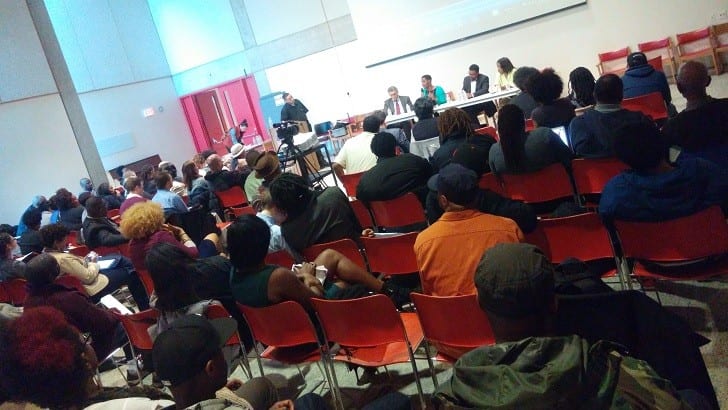Images by Chris Faraone
There’s a common saying among law enforcement officers and administrators that goes something like this: If you’re not doing anything wrong, then you have nothing to worry about. Though variations of that expression, some less cliché and far more subtle, are often used in reference to surveillance and security, comparable notions have been leveraged to rhetorically validate stop-and-frisk policies and any number of potentially unconstitutional actions.
Meanwhile, in light of their lack of openness across the board, authorities appear unwilling to apply the argument—that law-abiding folks have nothing to fear—to themselves. This is especially true of the notoriously non-transparent Boston Police Department. In the wake of several recent high-profile officer shootings of unarmed black men across the country, over the past six months there has been some discussion about cops wearing body cameras here and elsewhere. The reaction to such initiatives, however, has only further gone to show that when their own behavior is in question, police prefer to monitor themselves.
In the interest of exposing double standards around crime and punishment in the Hub—and in hopes of bringing more accountability to the citizen complaint and alleged misconduct review process—last week Roxbury activist and Blackstonian publisher Jamarhl Crawford hosted a forum at the Boston Public Library branch in Dudley Square titled, “Black & Blue: The Relationship Between the BPD & Communities of Color.” Among those on hand to address the nearly packed house: Massachusetts civil rights attorney Howard Friedman, Rashaan Hall of the Lawyers’ Committee for Civil Rights, and former State Sen. Dianne Wilkerson, also an attorney and one of the few public figures offering more than lip service on the topic of police brutality.
“This is not a new situation that we’re dealing with,” said Hall. On that cue, Wilkerson excavated some historical context that is critical to dealing with police violence and discrimination in the commonwealth. The author of the Bay State’s wrongful conviction compensation bill and other relevant measures, Wilkerson explained how big towns and small cities—in particular Brookline and Milton, on the immediate outskirts of Boston—effectively blocked legislation that could have cracked down on racial profiling.
 Buttressing a central argument of Crawford and the other speakers, Wilkerson acknowledged the 1992 St. Clair Commission report, which concluded there were “substantial problems in [BPD] leadership and management.” The findings of those outside evaluators more than two decades ago sound similar to common contemporary complaints, while recommendations made for departmental changes seem to have gone largely unaddressed. For example: When it comes to investigating their own, the 1992 commission observed a “hearing process characterized by shoddy, half-hearted investigations, lengthy delays, and inadequate documentation and record-keeping,” while “the present Internal Affairs process is unfairly skewed against those bringing a complaint.”
Buttressing a central argument of Crawford and the other speakers, Wilkerson acknowledged the 1992 St. Clair Commission report, which concluded there were “substantial problems in [BPD] leadership and management.” The findings of those outside evaluators more than two decades ago sound similar to common contemporary complaints, while recommendations made for departmental changes seem to have gone largely unaddressed. For example: When it comes to investigating their own, the 1992 commission observed a “hearing process characterized by shoddy, half-hearted investigations, lengthy delays, and inadequate documentation and record-keeping,” while “the present Internal Affairs process is unfairly skewed against those bringing a complaint.”
Natasha Tidwell, another panelist at the Dudley forum, brought figures that reflect enduring and historical systemic failure. A former police officer and prosecutor who now teaches at New England Law, Tidwell is a member of the Community Ombudsman Oversight Panel (“CO-OP”), first tasked by then-Mayor Thomas Menino in 2007 to “ensure fairness and thoroughness in the Boston Police internal affairs process.” Though essentially toothless on account of its lack of subpoena power—final CO-OP decisions rest with the BPD commissioner regardless of their recommendations—volunteer ombudsmen have spent hundreds of combined hours examining cases, and their latest findings, unveiled at the Black & Blue event, paint an ugly picture. For starters:
- IAD complaints from within the department more than doubled between 2009 and 2013 (from 76 to 158), while complaints from outside of the department more than tripled (from 105 to 369).
- Of the 15 cases checked by the CO-OP in this latest study, reviewers determined that 41 percent had IAD findings that were “other than fair and thorough.”
- Roughly 30 percent of cases reviewed by the CO-OP took more than two years for IAD to finish investigating.
In unpacking pieces of the 24-page study, Tidwell made a point of distinguishing the duties of her CO-OP—to “provide external oversight of certain Boston Police Department Internal Affairs investigations to assess whether those investigations meet the standards of fair and thorough”—from those of a more far-reaching entity like the New York City Civilian Complaint Review Board, which is a wholly independent agency with subpoena power. It’s an important distinction; considering the likelihood that IAD will not act promptly, and that even if they do investigate the findings may be far from thorough, people are considerably less likely to report inappropriate police activity in the first place.
A perpetual pain in the BPD’s collective ass, noted civil rights attorney Friedman used his turn to advocate for a better public records law—he says Mass has “one of the worst in the country”—and along with Hall and Tidwell stressed the need for multilateral community policing. Having a friendly cop presence and hosting youth activities is one thing; but additionally necessary, said Tidwell, is “holding your employees accountable.” About the St. Clair report, Friedman said one promising development from the ’90s was the forming of an “early intervention system” to screen for problematic officers. All these years later, however, the BPD has not disclosed any details about such a mechanism. To Friedman, that’s as good as having no system at all. “In the law,” he said, “if it’s not written down, it doesn’t exist.”
As for progress … even some activists acknowledge positive changes in the way of recent BPD promotions, while Tidwell of the CO-OP said, “I take Mayor [Marty] Walsh at his word that things are moving forward.” Some present from the Massachusetts Association of Minority Law Enforcement Officers (MAMLEO) were less optimistic though, with a few offering some of the harshest criticisms leveled at the BPD all night. Addressing the panel from the crowd, one MAMLEO member specifically said of his department, “I need to see more African-Americans on the gang squad and on the drug squad.”
Panelists repeatedly acknowledged the need for an increase in the number of cops who look more like the people they’re policing. Overall though, they endorsed a multi-prong strategy that includes strengthening diversity, but that also calls for everything from direct action to supporting legislation like Massachusetts House Bill 1575, which would ban police profiling on grounds of “actual or perceived race, color, ethnicity, national origin, immigration or citizenship status, religion, gender, gender identity, or sexual orientation.” As one man in the crowd said, police won’t change themselves; while detectives often ask folks in communities of color to testify against their neighbors, it’s rare that even benevolent officers inform on criminal and killer cops.
“Darkness is how they do this,” Friedman said. “We need activists to [hold police accountable], and we all have to be activists and help.”
A Queens, NY native who came to New England in 2004 to earn his MA in journalism at Boston University, Chris Faraone is the editor and co-publisher of DigBoston and a co-founder of the Boston Institute for Nonprofit Journalism. He has published several books including 99 Nights with the 99 Percent, and has written liner notes for hip-hop gods including Cypress Hill, Pete Rock, Nas, and various members of the Wu-Tang Clan.


